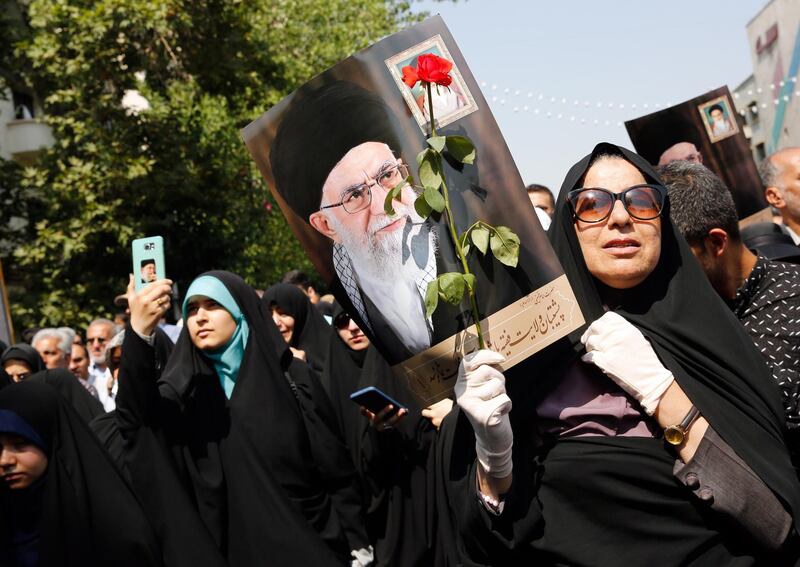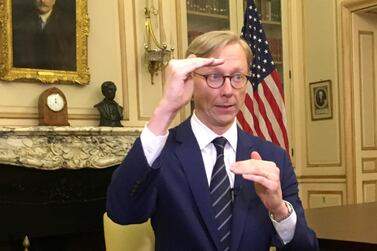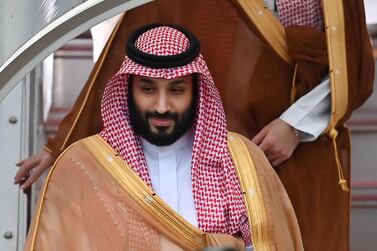European states are to announce their biggest commitment yet to keeping the 2015 Iranian nuclear deal alive through a cash injection into a new platform for trade with Iran even as Tehran is set to breach enrichment limits in the pact.
The last-gasp effort to provide credit to the Instex trade organisation is set to be greeted by dismay in Tehran, which has seen oil sales and other exports plunge under sanctions imposed by the United States after withdrawing from the nuclear deal last year.
The funding announcement at a meeting of the supervisory commission of the remaining members of the Joint Comprehensive Plan of Action (JCPOA) on Friday in Vienna is expected to be made by Federica Mogherini, the EU's foreign affairs commissioner.
Instex is a body established and sponsored by Britain, France and Germany. The Paris-based organisation has a mandate to barter essential goods with Iran under a legal shelter from the US sanctions.
The European countries maintain that the US sanctions are extra-territorial and have invoked a law that European compliance with the measures is illegal. That has not been enough to prevent dozens of European businesses from pulling out of Iran, prioritising access to the US market.
Mrs Mogherini trailed the announcement earlier this week when she said Instex had completed its set-up phase. "I believe that this is now ready for being operational and I hope this is something that can help keeping Iran compliance with the agreement as it has been so far," she said.
However, Iranian officials including the country’s central bank chief and leading Iranian diplomats have said Instex may not keep the deal alive.
"Sadly, the balance between the Islamic Republic of Iran’s obligations and rights under the JCPOA has been now upset, and considering the European side’s unfulfilled pledges, there remains no reason for the implementation of Iran’s one-way commitments,” said Abbas Araqchi, a deputy foreign minister on Thursday. “However, Iran has kept the window of diplomacy open by gradually reducing its commitments."
The Vienna meeting has loomed as a key date on the calendar since Iran gave notice it was ready to raise uranium output beyond the set limits, in effect killing the deal following the US withdrawal.
Europeans have resisted US efforts, spearheaded by Secretary of State Mike Pompeo, to assemble an international coalition against Iran.
German Foreign Minister Heiko Maas said the bloc would stick to a diplomacy-first policy. "The strategy of maximum pressure can't be the right one, because one of the consequences is that we are all talking about how serious the situation is, and that there is a danger of war," he said.
"This is the time for diplomacy," he added. "We have to ensure that these tensions are reduced, because otherwise any event without it being clear who caused it – could lead to ... a spiral of violence that ends in a war."
While Jeremy Hunt, the UK foreign secretary, said Britain was listening to the US arguments, he added London was concerned about the situation, which has seen Iran implicated in a series destabilising attacks around the region.
His comments were echoed in Dubai by Liam Fox, the international trade secretary, who broke ground on the British pavilion for the 2020 World Expo.
"We want to de-escalate the situation but we are of course extremely worried," Mr Fox said. "One of my ministerial colleagues was in Iran this week. We want to find a way to de-escalate the tension before the matters worsen from where they are today."
"I think it is the best way forward for the regional security, and the economic stability."
Brian Hook, Washington's Iran envoy, was in Paris on Thursday to reiteriate his call for joint action.
The G20 Summit in Japan is also expected to see talks about how to cope with the Iranian threat to the region and how to safeguard the oil trade under pressure at the Straits of Hormuz and Gulf of Oman. Speaking from Japan, President Emmanuel Macron said he was trying to play the role of mediator to ease the tensions.
"There is no brief war," Mr Macron warned. "We know when it's starting, but not when it's finishing."
Iran has said it is prepared to break the 300kg limit for low-enriched uranium stockpiles. Officials said it had been adding to its stores at a rate of 1kg every 24 hours and was on course to breach its limits over the weekend. Iran has further signalled it will up the enrichment levels of its uranium output beyond the 3.67 per cent limit.
The Foundation for the Defence of Democracy, a hawkish Washington think tank, said this week that President Donald Trump was focused on cutting a new deal with Iran. The American criticism of the nuclear deal is that it focused on one issue and did not address wider Iranian concerns. The Foundation said the White House should keep raising the pressure on Iran until it was ready to sign a broader accord. "There are at least three domains that a comprehensive agreement should seek to address: nuclear, missile/military, and regional aggression/support for terrorism," its report concluded.
It remains to be seen if Instex can meet Iranian expectations. One European analyst commented that like nuclear fusion, Instex was a breakthrough that was always just around the corner.








